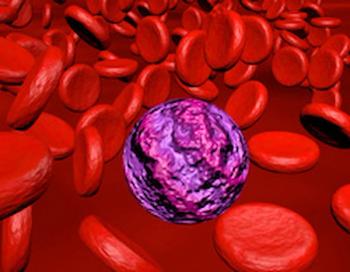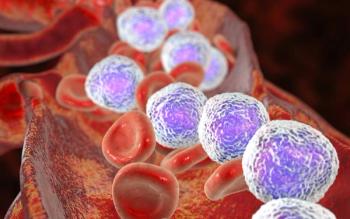
Patients with acute lymphocytic leukemia or lymphoblastic lymphoma can now receive asparaginase erwinia chrysanthemi at 25 mg/m2 on Monday and Wednesday followed by 50 mg/m2 on Friday, or 25 mg/m2 every 48 hours.

Your AI-Trained Oncology Knowledge Connection!


Patients with acute lymphocytic leukemia or lymphoblastic lymphoma can now receive asparaginase erwinia chrysanthemi at 25 mg/m2 on Monday and Wednesday followed by 50 mg/m2 on Friday, or 25 mg/m2 every 48 hours.

Factors such as chemotherapy treatment and a cancer diagnosis within the past 5 years were associated with a greater risk of frailty-related bone fractures among older cancer survivors, according to findings from a recent cohort study.

Among patients with Philadelphia chromosome–positive acute lymphoblastic leukemia, ponatinib plus chemotherapy yielded higher rates of minimal residual disease–negative complete remission compared with imatinib.

Two teams from leading institutions go head-to-head to debate the latest datasets and advances in chronic myeloid leukemia (CML).

Melissa L. Johnson, MD, spoke about the design of the phase 3 POSEIDON trial how its data led to the recent approval of tremelimumab plus durvalumab and chemotherapy in patients with advanced non–small cell lung cancer.

Martin Dietrich, MD, PhD, Sara Tolaney, MD, MPH, and Gregory Vidal, MD, PhD review recent data from the TROPiCS-02 trial on sacituzumab govitecan and discuss the clinical implications of these findings.

Zolbetuximab and mFOLFOX6 combination therapy demonstrated positive topline efficacy and safety in patients with Claudin 18.2–positive, HER2-negative gastric or gastroesophageal junction adenocarcinoma.

Ursula A. Matulonis, MD, indicated that acknowledgement of external targets such as FR-α could lead to success with antibody-drug conjugates in platinum-resistant ovarian cancer.

ATG-008 combined with toripalimab produced an objective response rate of 52.4% among patients with relapsed or metastatic cervical cancer in the phase 1/2 TORCH-2 study.

The VENTANA FOLR1 RxDx Assay has received approval from the FDA for identifying epithelial ovarian cancer in patients who may be eligible for treatment with mirvetuximab soravtansine-gynx.

Results from the phase 3 FRUTIGA study indicate that fruquintinib plus paclitaxel produced promising progression-free survival outcomes among patients with second-line gastric cancer, although no significant improvement in overall survival was reported.

Stereotactic body radiation therapy yielded numerical improvements in terms of local control compared with conventional hypofractionated radiotherapy among patients with stage I medically inoperable non–small cell lung cancer, according to findings from the phase 3 LUSTRE trial.

Ursula A. Matulonis, MD, spoke about the phase 3 SORAYA trial and how it helped lead to the approval of mirvetuximab soravtansine in folate receptor-α–positive platinum-resistant ovarian cancer.

The FDA’s decision to grant KVA12123 an investigational new drug application now allows its manufacturer, Kineta, to begin a clinical trial assessing its safety and efficacy across several solid tumors.

Results from the ongoing phase 2 IMMUNOCERV trial showed that treatment with the investigational drug PDS0101 — a vaccine — combined with chemotherapy and radiation induced a 100% clinical response in a small group of patients with stage IB3 to IVA cervical cancer.

Pulsatile, convection-enhanced delivery of topotecan using a novel subcutaneous catheter-pump system implanted into the brain showed promising efficacy signals in patients with glioblastoma, according to findings from a phase 1b clinical trial.

In a recent Between the Lines, Joshua Richter, MD, and Peter Forsberg, MD, discussed a recent commentary on weekly dosing and supportive care solutions for selinexor in patients with multiple myeloma, and provided a general overview of the agent in this treatment landscape.

The FDA has granted mirvetuximab soravtansine-gynx an accelerated approval for the treatment of patients with folate receptor-α-positive platinum-resistant ovarian cancer based on results from the phase 3 SORAYA study.

In patients with estrogen receptor–positive recurrent endometrial cancer, letrozole and abemaciclib combination therapy produced an objective response rate of 30% and a median progression-free survival of 9.1 months.

Interim data from the phase 1/2 TACTIC-2 trial indicated that treatment with TAC01-HER2 cell therapy produced a 67% disease control rate among a cohort of patients with HER2-positive solid tumors.

Andre H. Goy, MD, discussed the most pressing unresolved questions in the current treatment of MCL in an interview with the journal ONCOLOGY.

Data from a study indicated that durable minimal residual disease negativity was associated with stool butyrate production in patients with multiple myeloma who had plant-based diets undergoing treatment with lenalidomide maintenance.

Elevated circulating tumor fraction was associated with worsened overall survival across 4 advanced cancer types, according to data from an observational study.

In her Letter to the Readers, co-editor-in-chief of the journal ONCOLOGY Julie M. Vose, MD, MBA, reviews developments from the fourth annual LEAD Conference for women in hematology and oncology.

Patients with unresectable hepatocellular carcinoma who have recurrent disease following surgery or locally advanced diseases who will likely progress on local therapy may have an opportunity to benefit from tremelimumab and durvalumab following its FDA approval, according to Ghassan K. Abou-Alfa, MD.

For camidanlumab tesirine to be considered for an accelerated approval path in relapsed/refractory Hodgkin lymphoma, the FDA has strongly recommended conducting confirmatory phase 3 research at the time of biologic license application submission.

Findings from a meta-analysis highlighted an association between risk of cutaneous adverse effects and use of PI3K inhibitors across different types of cancer.

Patients with unresectable stage III non-small cell lung cancer derived the most benefit from durvalumab when combined with either oleclumab or monalizumab vs durvalumab alone.

The FDA has approved tremelimumab plus durvalumab for patients with metastatic non–small cell lung cancer based on findings from arms 1 and 3 of the phase 3 POSEIDON trial.

Patients with previously untreated high-risk pediatric lymphoma can now receive treatment with brentuximab vedotin with the FDA’s nod of approval.